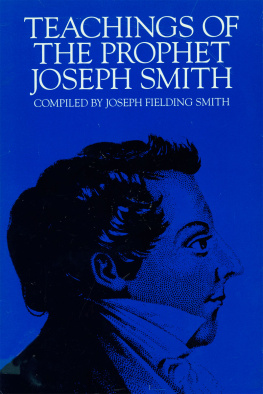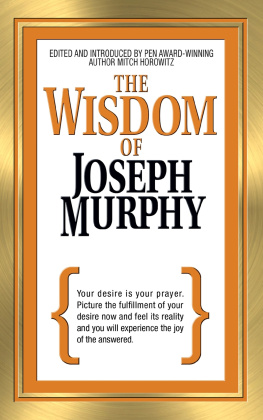Joseph Menn - All the Rave
Here you can read online Joseph Menn - All the Rave full text of the book (entire story) in english for free. Download pdf and epub, get meaning, cover and reviews about this ebook. year: 2003, publisher: Crown Publishing Group, genre: Detective and thriller. Description of the work, (preface) as well as reviews are available. Best literature library LitArk.com created for fans of good reading and offers a wide selection of genres:
Romance novel
Science fiction
Adventure
Detective
Science
History
Home and family
Prose
Art
Politics
Computer
Non-fiction
Religion
Business
Children
Humor
Choose a favorite category and find really read worthwhile books. Enjoy immersion in the world of imagination, feel the emotions of the characters or learn something new for yourself, make an fascinating discovery.

- Book:All the Rave
- Author:
- Publisher:Crown Publishing Group
- Genre:
- Year:2003
- Rating:4 / 5
- Favourites:Add to favourites
- Your mark:
- 80
- 1
- 2
- 3
- 4
- 5
All the Rave: summary, description and annotation
We offer to read an annotation, description, summary or preface (depends on what the author of the book "All the Rave" wrote himself). If you haven't found the necessary information about the book — write in the comments, we will try to find it.
Joseph Menn: author's other books
Who wrote All the Rave? Find out the surname, the name of the author of the book and a list of all author's works by series.
All the Rave — read online for free the complete book (whole text) full work
Below is the text of the book, divided by pages. System saving the place of the last page read, allows you to conveniently read the book "All the Rave" online for free, without having to search again every time where you left off. Put a bookmark, and you can go to the page where you finished reading at any time.
Font size:
Interval:
Bookmark:
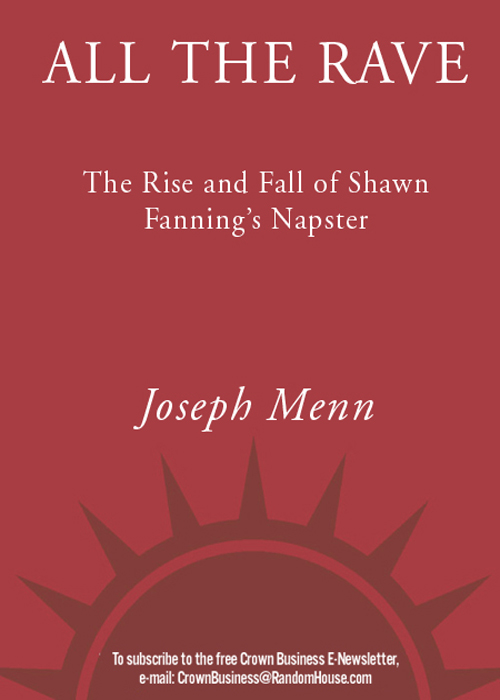
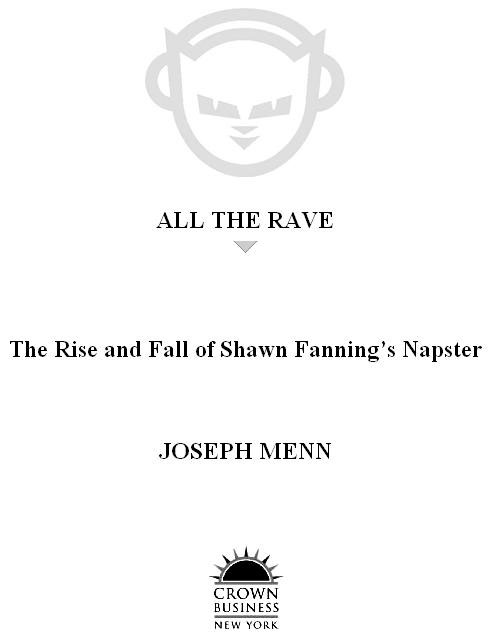
Contents
Observe my uncle. If his occulted guilt
Do not itself unkennel in one speech,
It is a damned ghost that we have seen,
And my imaginations are as foul
As Vulcans stithy. Give him heedful note,
For I mine eyes will rivet to his face,
And after we will both our judgments join
In censure of his seeming.
Hamlet
FOR SAMANTHA, MY LOVELY WIFE
Authors Note

I was not one of the throng of journalists who wrote dozens of stories about Napster during its peak from late 1999 through mid-2001. Like many, I figured that the exhaustive newspaper and magazine coverage was plenty. It was only in late 2000 that I met some of the talented people who worked at the company and realized how wrong I had been. Not long after, I came to the conclusion that Napsters real story could be told only in an investigative book, for three reasons.
First, for all of the surface coverage in the media, an astonishing amount of information was never made public. Most important, there was the unseen role of the man who incorporated Napster and essentially controlled it through its crucial first year, before the professionals took over. That man is not the enigmatic Shawn Fanning, the Time and Fortune magazine cover boy and the worlds best-known hacker, whose message of free music eventually attracted as many as 70 million registered users. That man is Shawns uncle John Fanning, who kept 70 percent of Napsters stock at its inception. John Fanning was a struggling but ambitious businessman with bad debts, a habit of mixing personal and company matters, and a confrontational style that brought him multiple lawsuits and a police record. By design, Shawn Fanning was pushed forward as the young spokesman for a computer-powered movement. But his uncle best represents what Napster became. And John Fanning was just the beginning. Other key employees brought in under his leadership were also well familiar with angry investors, the courts, and the cops long before Napsters landmark fight with the record industry. Their roles too have never been examined. All told, the undisclosed chaos, betrayal, and dissension within Napster made the record-industry lawsuit look like a friendly game of chess. And it is somehow fitting that the rapid development of this weapon for allowing consumers to take control away from the entertainment-industry giants also illustrates so dramatically the power that a few individual entrepreneurs can wield in a post-Internet society, for good or for ill.
The second reason that Napster merits book-length treatment is how different it was from all the other excesses of the Internet bubble. Napster wasnt selling pet food or baby products online. The fastest-growing business of all time, Napster had an innovative technology, true to the Nets roots, that fired up not only the computers of the music-craving masses but also the imaginations of CEOs at some of the biggest companies on the planet. And driven by leaders who kept doubling Napsters bet, it pushed the edge until it defined where the lines would be drawn on some of the most important political and economic issues of the day, including digital piracy, consumer rights, freedom of speech, and the future shape of the Net itself. As I write, the leaders of Hollywood and Silicon Valley, two of the most powerful industries anywhere, are jousting on Capitol Hill over whether widespread anticopying mechanisms will be mandated in the computers of the future. All that from the mind of an idealistic seventeen-year-old from Cape Cod who got some very bad advice.
The third reason nearly contradicts the second. While Napster was different, it also epitomized what went wrong at the hottest spot in capitalism in the historic boom at the turn of the century. It was exactly like everything else that was happening, only much, much more so. In Napsters case, billionaire venture capitalists were willing to put millions of dollars behind something that was not just foolish, as so many start-ups were, but something that they had already concluded was illegal. If the investment philosophy that powered Napster was badly overcharged, so were the characters that led it. But they too were archetypes of a remarkable era. A little rougher around the edges and a little more reckless, to be sure, but the sort of people who seemed almost genetically designed to take advantage of the mass mania that surrounded them. Read correctly, the story of Napster proves that the influx of investment money credited with spreading technology faster and wider than ever before also corrupted the evolution of that technology, provoking a brutal backlash.
This book is based on hundreds of interviews with virtually everyone who was important at Napster and many of the people they came in contact with, from their childhood years through Napsters dealings with media titan Bertelsmann AG and the companys bankruptcy. (Bertelsmann also owns the publisher of this book.) My dealings with John Fanning were more limited. They included authorized interviews with his companys lawyer and publicist, his hanging up the phone and shutting a door in my face, and his response to an e-mailed list of questions, an answer that consisted chiefly of his claim that the questions alone were grounds for a lawsuit.
My work is supported by police and court records from the states of California, Massachusetts, Delaware, Pennsylvania, and Washington. I also have relied on scores of confidential internal company documents, nonpublic depositions and other material from the legal battles, and thousands of e-mails from within Napster, the recording industrys trade group, and elsewhere. To avoid a mind-numbing excess of endnotes, you can assume that unless I say otherwise, when I refer to such a document, I have read it. Likewise, oral statements in quotes are from author interviews unless the endnotes say differently. Reconstructed speeches that are not from a court transcript or tape and that I did not personally hear are usually from the recollection of the speaker. There are some instances when a listener is the source. Whenever possible, these recollections have been confirmed by the other parties, and any conflicts have been resolved by the elimination of the material or by noting the discrepancy.
Because nearly all my reporting required substantial help from others, I owe almost everyone named in it a debt of gratitude. I would especially like to thank those who spent many days with me, some of them painful, to make sure I had the facts right, knowing that they themselves would not emerge unscathed. For exceptional bravery, I commend Napsters first Silicon Valley CEO, Eileen Richardson, founding developer Jordan Ritter, and cofounder Sean Parker, among others. Of the many good people still working for Napster when they spoke, I want to especially thank Shawn Fanning and Ricki Seidman, who prevailed on employees to meet me. My own employer, the Los Angeles Times, showed remarkable forbearance in giving me six weeks leave at a time when not one but two of the Fortune 100 companies I cover were embroiled in public trials. I want to thank editor John Carroll, managing editor Dean Baquet, business editor Bill Sing, and senior technology editor Russ Stanton, who helped me in more ways than I can say. Thanks also to digital-music writer Jon Healey and the talented colleagues who filled in for me. And I am grateful to the readers of my early drafts, Anthony Efinger, Mark Saylor, and Samantha Zee; my editor, Doug Pepper, and others at Crown; my agent and friend Elizabeth Kaplan, who strides from mountaintop to mountaintop; journalist Dan Goodin, who raised the first questions about John Fanning; Celia Francis, for crucial introductions; and the queen of hospitality during my stay in Boston, Rachel Layne.
Next pageFont size:
Interval:
Bookmark:
Similar books «All the Rave»
Look at similar books to All the Rave. We have selected literature similar in name and meaning in the hope of providing readers with more options to find new, interesting, not yet read works.
Discussion, reviews of the book All the Rave and just readers' own opinions. Leave your comments, write what you think about the work, its meaning or the main characters. Specify what exactly you liked and what you didn't like, and why you think so.

